Sheenagh Pugh's Blog
October 16, 2025
Review of maybe i'll call gillian Anderson by Rhian Elizabeth, pub. Broken Sleep Books 2025
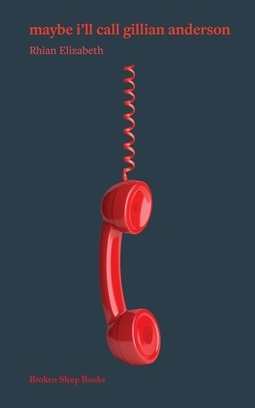
This is very much a themed collection; its genesis was empty nest syndrome resulting from the departure of a daughter to university, but as is generally the way, one emotional preoccupation leads on to others, memories of the mother’s own youth and past relationships. The words “mother” and “daughter”, though, remain central throughout.
The sense of the daughter’s absence is sharply evoked in poems like “the winter the murders stopped”:
i miss hearing the creak of my daughter’s bedframe
in the middle of the night, miss being summoned
for glasses of water she could easily
get herself, and now my house is filled
with spiders, since there is
no one here afraid of them
Memories of this daughter as a child
as soon as you could walk you had the inclination
to bolt and there was i, forever yanking you back
on your reins (“the bolter”)
mingle with memories of the narrator’s own childhood sleepwalking: “i was an escape artist in a pair of fluffy pink slippers.” (“escape artist”). Indeed escape, of a kind, is also central to the poems, in that many of the remembered or imagined relationships in the collection end in failed contact. The idyll of “drowning on a stranger’s couch”, in which two people seem to be fulfilling each other’s emotional needs, ends with
you will never
write the letter you vow you will write when you eventually
return home to wales a few weeks later, the
thank you to the stranger who misses
being a mother, from the girl who misses being a daughter.
And in “glasgow”, what looked like the start of a promising friendship also ends with the parties each going their own way:
on one of your days off you took the bus
into glasgow and brought me back a stuffed polar bear that i still have.
and then one morning,
some weeks after the bear,
i heard from one of the housekeepers
you’d caught that same bus
in the dead of night, rode out to some other hotel in some other country,
onto some other adventure. you left me alone
If this sounds despondent, that is not how the collection comes across, because there is quite a lot of wry humour in the voice, also a recognition that one cannot own people, nor keep them for ever – the daughter “is not lost, she is free” (“i didn’t call gillian Anderson”), and “the person next to me is not mine either, not really,/ because people never are, are they?” (escape artist”).
Some things about the poet’s technique will by now be evident; she doesn’t feel everything needs to be left-hand justified and is happy to use all the white space on the page, which is always rather a pleasure to me as a reader. And she works only in lower case, which some readers will not like so much, but it does seem to suit the conversational, informal tone of these poems. She also, at least in this collection, works mostly in the first person (occasionally in the second, when addressing the daughter). There are hazards in the “I” voice, notably the danger of sounding self-absorbed and sentimental. I think she mostly avoids this through the use of humour, though the last two lines of “the bolter” do strike me as not only predictable but a bit saccharine in tone. Mostly, though, she manages her endings well, making them memorable without looking contrived or sought-for. Indeed the last three lines of the last poem, which I won’t spoil by quoting, undercut the emotion of the collection in a way that raises a wry smile.
October 1, 2025
Review of Aleph Bet by Sue Rose, pub. Cinnamon Press 2025
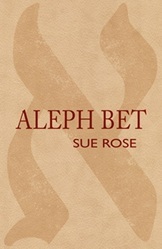
This is one of those collections inspired by Covid, but in an odd way. The author, though of Jewish descent, had not learned Hebrew as a child, nor especially missed it, but “the imposed solitude and feelings of collective dread in those strange times prompted an urge to reclaim something of my heritage and explore my identity. My parents were both dead by this time and the vacuum of lockdown made me long for community and a renewed continuity with the past.”
Hence a renewed engagement with learning the language. But Rose, besides being a poet, is a translator, and soon became interested in the language for its own sake rather than just as a source of personal memories. “When I did more research into the letters, I became fascinated by their different layers of meaning and the further I delved into the symbolism of each letter, the more interested I became.” And so we have a sequence of poems in response to each of the 22 Hebrew letters. It also, as befits a project concerned with heritage, includes images of religious objects which had significance for her forebears.
It is obvious from the first, title, poem how conscious she is of the history and physical reality of language; the way its shapes evolved from pictures and from being carved into stone (“Aleph Bet” is of course the ancestor of “alphabet”):
rapped right to left, hammer
and chisel tap-dancing
thought into endurance,
tablet dust a halo rising.
She is conscious too of shape, the shape that sounds make of a mouth and their own shape on the page
this letter is a hard kiss
of sound, a pursing of lips […]
This is the sign,
in shape and meaning,
for a house, its door open,
beckoning always
(Bet)
Our letters are a lot further removed from pictograms than those of the Hebrew alphabet. Though C and G are our closest equivalents of the Greek gamma and Hebrew gimmel, neither much resembles a camel with an outstretched neck, as gimmel does. The recognisablility of the pictograms enables us to see what was important to the people who invented these ways of visually representing sounds: a tent, a riding animal, water. They also lend themselves to imagery: mem can mean water, but also a womb, since water is the source of life. All these layers of meaning (somewhat reminiscent of the readings of Philip Pullman’s alethiometer) naturally fascinate a linguist like Rose, and of course for all those fortunate enough not to be monoglots, there is also the fascination of their accidental resemblance to the words of another language:
One
of the elemental mothers—
aleph, mem, shin: air, water, fire—primordial
mem keeps mum,
clamp of lips at teat,
a murmur of mam, mummy, am, immi,
names like mementos
recalling the mmm
of comfort and home.
(Mem)
There is of course a personal relevance to this, which surfaces elsewhere:
this letter
is forced between lip
and teeth, delivering
the vim in words
like lev, heart, avi,
my dad, hav, give, ahava,
love
(Vet)
Ultimately though, if I had to define the overarching theme of this collection, it would be neither Judaism nor a sense of personal identity and heritage, but the nature of language. How and why it develops, how it works physically, how it shapes our thoughts. The notes at the end, explaining more about the individual letters, will be fascinating to anyone with an interest in linguistics. And there are times in the poems when the wordplay begins to echo George Herbert, convinced that two words do not sound alike by pure accident:
Repentance
may yet ring changes
to convert a pauper,
rash, and rasha, a rascal,
to rosh, head, the skull
a crown, righteous as one
throwing stones
(Resh)
Apart from a couple of slightly unexpected near-contemporary images in “Shin” – “fingers split like Spock/for a tripartite salute” – and “Dalet” – “the blinking 404/error of existence” – there is only one definite reference to a contemporary event: covid, in “Kaf/Khaf”. But the last poem, “Unknown”, concerns a letter traditionally said to be missing from the alphabet and whose eventual revelation will set all wrongs right:
this is the missing shape
that will mend the place
of hurt where grief plumes
like a city of debris rent
with sirens
It is implied that we don’t yet even know how to make the sound of this letter; it might be palatal or labial, but if we ever find out,
it will rise in thanksgiving
from our depths and press
its utterance to the cheek
of the child who sleeps
through the night’s silence.
Which last outcome we can all agree would be highly desirable, though it currently seems most unlikely. This is a sequence which would appeal to anyone interested in heritage and identity, but above all in language.
September 16, 2025
Review of Leaving the Hills, by Tony Curtis, pub. Seren 2024
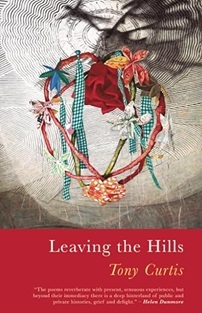
Tony Curtis has now been active in poetry for some 50 years, and as might perhaps be expected, this collection is very retrospective, sometimes elegiac, in tone. There are many childhood reminiscences, tributes to departed friends like Dannie Abse, Helen Dunmore and Glyn Jones, and poems centring on the history of Carmarthenshire, where Curtis grew up. To quote (in translation) the Welsh poet J T Jones, a man in old age is drawn to the scenes of his youth, “to walk in the places where he used to run”. But Curtis has also been a much-travelled man, and this is reflected in poems set in the US and Europe.
In poems like “Visiting the Big Man”, the elegiac tone is very pronounced:
We looked across the fields
for what had gone
and what we’d never see again.
That would have been the last time
I saw him, or maybe the time
before the last time.
Those three “time” line endings strike like hammers, or the tick of a clock, emphasising both the passing of time and the fallibility of memory.
But though the poet is necessarily conscious of mortality (even, in “Further instructions”, leaving guidance for the disposal of his ashes), elegiac does not have to mean unremitting gloom, and these memories are mostly positive. There is keenly observed nature,
Sparrows bicker in the bankside bramble (“The Guardian”),
and the “Bosherston Pike”,
angling through the lily roots,
Razor teeth and steel-clasp jaws
Cruising the pools like a U-Boat in the shadows.
There are intriguing “characters” from the past, like Jimmy Wilde and Anne James. There is also the present, in the form of grandchildren and, still, new experiences:
stare up through the huge pines and meet
a sky that comes down to greet us
with its diamonds closer,
bright and sharp and beyond number,
met as if for the first time. (“Yosemite”).
Having said that, there is undoubtedly a dark streak running through the collection, perhaps best exemplified in the often ambiguous and mood-changing endings of some poems. From that of “Railroad – “blood and dreams. Everything we need/ it seems” to the sinister double meaning in the last line of “In the Duomo, Siracusa”:
out of the body in death, that motherly caress,
the waiting over, knowing your depth
and it’s taking you in.
“Scrolling Down”, a list poem which is his one concession to the internet age, didn’t really work for me; it highlights the random nature of news stories and the way they manage to equate the vital and the trivial, but we all knew that. There are, inevitably in a retrospective like this, a great many personal references, especially to friends and acquaintances. I know from experience that this can sometimes irk readers (or maybe it’s just reviewers), but it really shouldn’t, as long as the writer has managed to find the universal in the particular. We have all lost friends and relatives; all found inspiration in odd corners of history, and we should be able to mentally substitute the names in our own experience for those in the poem. I was reminded a couple of times of a review of one of my own collections, which opined that it wouldn’t please any reader who was “not interested in history”. I think that is true of this collection too, but then I can’t actually imagine what such a person would be doing reading any kind of a book.
September 1, 2025
Review of Our Daily War, by Andrey Kurkov, pub. Open Borders Press 2025
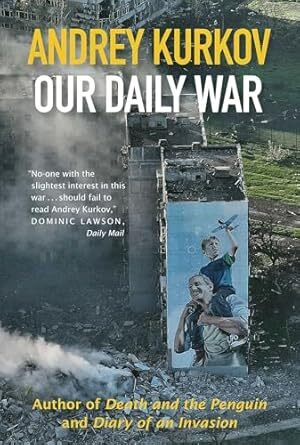
All the policies of tsars are now being implemented by Russian President Vladimir Putin. Teaching in Ukrainian is once more prohibited in the occupied territories of Ukraine and Ukrainian books are being withdrawn from libraries there.
I’ve already reviewed one book about the war in Ukraine, last year. That was the journalist Jen Stout’s Night Train to Odesa, by an outsider whose interest in the area led her to spend time in a war zone. This, by contrast, is an insider view: essentially the diaries and other connected writings of the novelist Andrey Kurkov, who was Russian-born but has lived in Ukraine from the age of two and naturally considers himself Ukrainian.
Like Stout, he is informative on what it is like to live in a constant state of war; he notes, as she did, the way people get blasé about air-raid warnings, and the expanding vocabulary of children (to judge by his surprised tone, the f-word was, before the war, far less common among Ukrainian children than it has long been among English ones). He dwells more than she did on the effects of power cuts, having experienced more of them: “The Russian aggression has given electricity a very bad name. People in older buildings with gas stoves and ovens consider themselves very fortunate. They can cook and make hot drinks. What is more, bricks placed strategically on the gas hob can heat a room quite effectively”. And there are chilling details like this: “In the Kyiv metro, there are adverts for apartments in newly built blocks. The posters show floor plans and I noticed that all the new apartments have rooms set around a spacious, windowless area – a clever design for wartime.”
What I hadn’t bargained for was how, as both a writer and a Welsh person, I would identify with him in the culture war. Kurkov can speak and understand Ukrainian, but his native language, the one he grew up hearing his parents speak, is Russian and as any writer knows, it is very hard to compose in any but one’s native tongue. Kurkov still writes in Russian but does not publish in it; he gets his work translated into Ukrainian and other languages and it is the translations that get published, not the originals, a decision eased by the fact that his work has been unwelcome to the Russian authorities since he took part in the Orange Revolution.
You’d think this would qualify him as a Ukrainian writer in most people’s eyes, but as Welsh writers in English will know, things are not that simple: “I continued to write literary texts in Russian but I called myself and considered myself a Ukrainian writer. Some of my Ukrainian-speaking colleagues treated my self-identification with hostility. They stubbornly called me a Russian writer and insisted that if I wanted to call myself a Ukrainian author I should switch to writing in Ukrainian.” Groans of recognition… The one difference, as far as I can judge, is that Ukrainian and Russian are a hell of a lot closer than Welsh and English, so it might be easier to switch between the two, but it still wouldn’t be that easy.
This linguistic antagonism is not universal; “Odesa is a commercial city – full of sellers and buyers – where people are used to responding in the buyer’s language if they know it. At the central market, in addition to Ukrainian and Russian, you will hear Moldavian, Bulgarian and Gagauz. Hatred of Russia, which is evident at every step around the city, has not transposed into hatred of the Russian language”. And bigoted statements do generate angry responses:
“The climax of this round of the fight over language was a statement from the infamous anti-Russian-language crusader and former Member of Parliament, Iryna Farion, who declared that Russian-speaking Ukrainian soldiers should not call themselves Ukrainians. Feedback from both Russian- and Ukrainian-speaking soldiers was not long in coming. Ukrainian soldier Ekaterina Polishchuk – known throughout the country by her call sign Ptashka (Birdie) – who fought in Mariupol and survived Russian captivity, said: “Your position is not pro-Ukrainian and I consider you a project of the Kremlin. You are an enemy, promoting poisonous narratives. Your position and statements are complete shit. I say this as someone who spoke Ukrainian in captivity and who has been defending Ukraine for three years side by side with heroes who speak Ukrainian, Russian, Georgian, Belarusian, Polish, dozens of dialects, English, and dozens of other languages …” Kurkov adds that the commander Major Zhorin responded with a similar message, “but in words nobody was likely to print”.
Nevertheless, the intolerance of language zealots is understandable; if you spend generations undermining someone’s language and culture, they are liable to attack yours in return. Hence the recycling project in Kyiv: “turning Russian-language books into pulp to raise money for humanitarian projects. This campaign is not spearheaded by the state but by Ukrainian-language writers and cultural figures who believe that he preponderance of Russian-language books in libraries, both public and domestic, is an aspect of Russian aggression.” Understandable but saddening, like the campaign against the memory of Mikhail Bulgakov: “a memorial plaque dedicated to the writer was publicly removed from the wall near the entrance to Kyiv University, where he studied. Now a host of Ukrainian intellectuals and writers have decided to ‘take up arms’ against his museum”. The issue with Bulgakov is not just that he wrote in Russian but that he opposed Ukrainian nationalism. But he’s long dead, he was a fine writer, and Kurkov plainly shares the Facebook view of the Ukrainian soldiers who comment on such goings-on: “While we are fighting here, are you out of your minds?”
I must not imply that the cultural question dominates unduly. There is far more about politics, the course of the war and everyday life for civilians in wartime. And it is fascinating and informative, from remarks like “Ukrainian children can already tell the difference between the sound of a blast made by air defence systems and the noise of the explosion of a missile hitting its target” to humour, like the story of Grandad Danylo, the one man in Kurkov’s village near Kyiv who, in the 1980s, subscribed to a newspaper: “Every morning, a postman cycled up to the gate of Danylo’s house and left a newspaper between the slats in his fence. Danylo immediately pulled it out and read it from cover to cover before beginning his “anti-Soviet” activities. He walked along the street stopping to talk with everyone he met, calling over the fence to neighbours if he saw a potential interlocutor in a courtyard. First, of course, he greeted them and then he told them, in detail, what the Soviet press was lying about that day.”
But the book is essentially the diaries of a writer in wartime and not only does the cultural aspect naturally matter a lot to him, it also resonates more with any reader who shares that preoccupation.
August 16, 2025
Review of Fire: Brigid and the Sacred Feminine, eds Shauna Gilligan & Niamh Boyce, Arlen House 2024
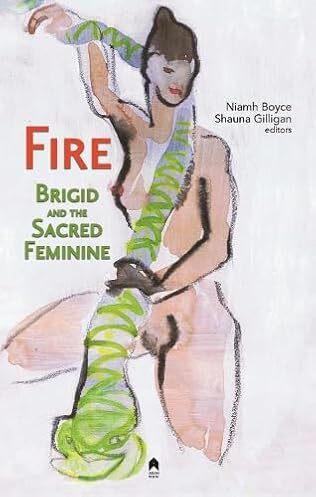
This is an anthology of poems, prose pieces and artwork celebrating “the sacred feminine, Brigid, and the heritage of Kildare”. It becomes obvious quite soon that “Brigid” is but one avatar in a long line of female figures of worship going back through mythology to the great Asian goddess variously known as Cybele, Isis, Lady, Mother and much else. The “brideog” dolls which are dressed in white and resemble slightly potato-faced children were once made of straw, which betrays their origin as corn-doll fertility symbols. Indeed Katie Donovan’s poem “Charm” references not Brigid but that other famous feminine symbol Venus of Willendorf, “totem of pleasure and plenty”, powerfully contrasting her “yeasty curves” with the stick-thinness of starvation or anorexia. Jesse Hill’s macaronic “Selkie, Find Your Skin” uses the Scottish Gaelic myth of the seal trapped in the skin of a woman, while Lenore Hart’s “Lady of the Beasts” has for its title yet another name by which the Great Goddess was known, and for its theme another of her attributes, as a guardian of animals. A more modern myth of Hans Andersen’s surfaces at the end of Claire Blennerhassett’s “Feabhra” (February, the month of Brigid’s feast day), in which an idyllic portrayal of a little girl is undercut by the sinister ending:
your playful feet
dancing in red
t-bar shoes.
Though mythology is at the back of everything, there are several pieces set in the present day, in which the image of Brigid acts to empower a woman – in Caroline Busher’s prose piece “Brigid and the Heart-Shaped Womb”, not only does water from Brigid’s well help a post-menopausal woman to become pregnant, a sense of Brigid’s determination and agency seems to enable her to discard an unsatisfactory former flame; her feelings go from “there was something about him that she found impossible to resist” to “He was no more than just a face in the crowd”. And in Catherine Anne Cullen’s sharp “Brigid of the Bargain Bins” a modern-day Brigid proves a match for the harsh circumstances of her life:
She checks the prices of sliced pans,
weighs up own labels against known brands.
She knows they cut corners with prices,
sees through their tricks, has a few of her own.
The third element in the title, “the heritage of Kildare” perhaps features less obviously than the others, but in the prose piece “Strong Bridgets” by Alison Wells, the landscape comes across very clearly:
Decanted suddenly, as a young child, into landscape. Bequeathed an inheritance of bogs, wide skies, rock castles, pools of frog spawn, moss and furze and rushes, holly trees and hideaways. A V-shaped valley between hills, like arms opening out, like a cloak thrown across vastness, marram grass rippling, folding, silk, spreading and settling all round.
This is an anthology of poems, prose pieces and artwork. Though the artwork is scattered throughout, the anthology seems otherwise to have been arranged with mainly poems in the first half, prose in the second. I’m not entirely sure this is the best way of doing it; sometimes after a longish piece of prose one welcomes the different kind of concentration, shorter but more intense, that a poem needs.
Brigid’s blue cloak, reminiscent of how the Virgin Mary is so often portrayed, marks her as, like Mary, an attempt by the adherents of a monotheist religion to make up for the lack of a female deity (ironic, really, that she is no longer officially a saint, having been dropped from the calendar by Pope Paul VI on the ground that there’s no evidence she actually existed). One does wonder if the Vatican’s real problem with her was that she shared too many attributes, including her name and feast day (Imbolc, February 1st), with a pagan Irish goddess. In this anthology Monica Corish’s “Keepers of the Flame”, an excerpt from a novel, imagines a meeting between the two. There are aspects of her, like her association with metalwork, that are strangely un-nunlike, and one of her miracles, in which she helps an unwillingly pregnant woman by making the embryo “disappear without pain” (see Maureen Boyle’s “St Brigid in the Orchard”) must have raised some clerical eyebrows. I don’t suppose her de-listing will have stopped folk celebrating her feast day and legends, in which she “exists” in a different way from that envisaged by Paul VI.
August 1, 2025
Review of A Bird Called Elaeus, by David Constantine, pub. Bloodaxe 2024
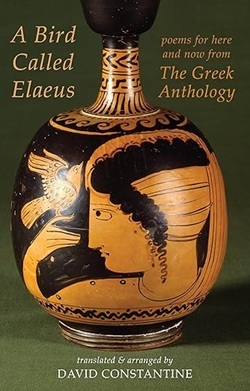
The thing about the Greek Anthology; it is universal in a way so much poetry aspires to be. It deals with universal human concerns, which is why it lends itself not just to straight translation but to re-making in other contexts. There is some of both here. Constantine’s translation of an epigram of Leonidas of Tarentum is fairly straight:
This here is Clito’s bit of a dwelling, this
The bit of land he sows, that there’s
His vineyard, that his wood, both scant. Nevertheless
Among these meagre ownings Clito’s clocked up eighty years.
This felt oddly familiar, and was, but not via Leonidas. I was recalling the Orkney poet Robert Rendall:
Look! This is Liza’s but and ben,
Wi’ screen o’ bourtrees tae the door,
Her stack o’ peats, her flag-roofed byre,
Her planticru abune the shore;
Yet ‘mang her hens and household gear
She’s brucked aboot for eighty year.
Constantine is himself a fine poet and his versions of the Anthology poets are as sensitive and effective as one might expect. The poets he has chosen are a personal selection. The predominance of Leonidas must be a personal preference, and understandable, because the man was such a superb epigrammatist that one wonders if there has ever been a better. Constantine also makes a point of foregrounding the female poets who are often overlooked, especially Anyte of Tegea, whose work also fits in with a thread of kindness to animals that runs through the selection – this concern for nature and our fellow creatures will resurface in the Coda, a section of his own poems inspired by the Anthology. Anyte was clearly an animal lover, and several of the Anthology poets express indignation at ill-treatment of horses or sympathy for injured dolphins, seen as friendly to man. Perhaps the most moving is Addaeus of Macedon, praising a grateful farmer:
When his labouring ox was worn out by old age and the furrows
Alcon, reverencing him for his service, led him not to the slaughter
But to a meadow of deep grass. There how this fellow creature
When Alcon strolls out to visit him at the hour of shadows
In grateful delight lifts up his head and bellows!
“This fellow creature” – we do not often think of the ancient world as a kindly place for other species, but some of the Greek anthology poets clearly had a sense of fellowship with them.
This kinship with animals is a major theme of the epigrams he has chosen. So are human relationships, often expressed in the sense of loss on the death of friends or kin, and the often troubled relationship between humans and their environment, especially the sea, on which so many Greeks found both a living and their death.
In the “Coda” we have a further development, wholly original poems constructed on the acknowledged model of the Anthology poems. Many are full of contained anger and sadness both at what we do to each other:
Laws of war
We too had laws of war: don’t poison wells
Don’t fell the olive trees (they take so long to grow)
Don’t bomb the schools, don’t bomb the hospitals …
Stranger seeking our monument, look around you.
and at what we do to the environment and to other creatures:
Albatross chick
Opened, this babe’s full stomach looks like a trove
Of bright things stowed away for an after-life.
What we cast on the waters is not the food of love.
Nothing will come of us for you but grief.
Perhaps the two most striking examples concern the death of children. In the main body of the work, he translates Zonas, being as universally relevant as any poet has ever been:
Dour ferryman, coming for the child Euphorion
When you hush your prow through the reeds and touch the shore
Be kind. His father, standing in the muddy shallows
Will hand him up the plank. Reach down, Charon
Bring him carefully on board. Those are his first sandals,
His pride and joy. But his footing in them is still unsure.
And then we have Constantine’s own take on a child in the aftermath of war:
Child After.
Over and done with. All gone.
She is too small to be left on the road alone.
Another day, another night, will nobody come?
Death will, a kindness, and take her home.
I found it interesting to compare Constantine’s versions with those of Dudley Fitts in his “Poems from the Greek Anthology” (1978). Fitts’s choice was often different, he translated many more humorous poems, but when he and Constantine translate the same poem, you couldn’t say one version was better than another, more that they have looked at the poem from slightly different angles. But that’s the Anthology for you: new to everyone who reads it and the proof that ancient models still say something to living poets. Genius can’t date.
July 15, 2025
Review of The Ship Beneath The Ice, by Mensun Bound, pub. Macmillan 2022
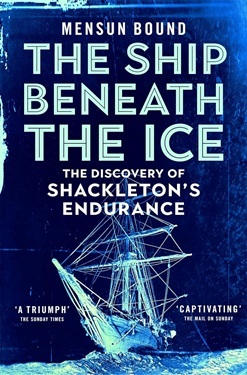
“Chad suddenly said, ‘Goddammit, I gotta get me some grandchildren. What’s the point of finding the Endurance if you don’t have grandchildren to tell the story to?’ So I told Chad about a little moment in Macklin’s unpublished diary in which he was thinking about what he would do in old age if he survived. He saw himself sitting beside an inglenook fireplace, telling his grandchildren the story of the sinking of the Endurance and how they survived on the ice.”
Mensun Bound is a marine archaeologist and this is the story of his two attempts, one unsuccessful, the second triumphant, to find the Endurance, sunk in the Weddell Sea in 1915 during Shackleton’s Antarctic expedition. This theme lends itself to a two-strand retelling, comparing Shackleton’s original journey with that of the searchers for the ship, which is how Bound handles it.
aThis is quite handy, since he can keep his own diary of events but augment the long journey south, when nothing much is happening yet, with the diaries, largely unpublished, of members from the original expedition. By this process we gradually get to know Shackleton and his companions, and it becomes clear that for all their courage and fortitude, they were as fallible as anyone else and certainly no band of brothers. They were snobbishly exclusive towards the ship‘s crew, who resented it, and they understandably fell out a lot among themselves when stranded on Elephant Island. To quote Macklin’s diary; “Do what one will, one comes at times to hate the very sight of some particular unfortunate from whom one cannot escape. The way he looks, or eats, or walks, or sniffs, becomes abhorrent”.
Bound, a Falkland Islander, grew up with tales of Shackleton and clearly admires him immensely, but not to the extent of being unaware that he too had flaws; he could be autocratic, seems to have chosen his team specifically with an eye to eliminating any dissent and was petty enough to deny the Polar medal to Chippy McNish, the one member who did defy him.
The characters of those on the search expedition come over less strongly (possibly because there was less dissent, or because they’re all still alive). But the major character in this strand of the retelling is in any case the Antarctic itself. It is, of course, a landscape like no other:
“In all directions our view is dominated by bergs that range in shape and size from soaring, pointed multilaterals and long, vertiginous flat-tops to smaller thimbles, pinnacles and broken teeth; and finally there are the plumper and more bosomy bergs whose edges have been softened by snow.”
The wildlife, so long unmolested, is equally impressive; “Looking down, I could make out a number of seals suspended, motionless, in a vertical position, with only their nostrils protruding through the brash ice beside the ship. […] Most remarkably of all, they were actually coming right up to our submerged hull and nuzzling us with their noses.”
As they near the search area, there is a lot of tension, provided not least by the unpredictability of the technology they are using to search in conditions where it is largely untried and where one little thing going wrong can wreck everything, particularly given that any repairs have to be somewhat Heath Robinson: “It was not a sophisticated repair job, but one requiring successively larger hammers. They started off with a carpenter’s hammer and when that wasn’t big enough they sent for the blacksmith’s block hammer, and when that didn’t work they lowered down a sledgehammer. That worked.” There is a grimly amusing moment when one of the team members decides that state-of-the-art isn’t always best: “He spotted an old winch in storage and asked if he could also have that one for the project. Everybody was of the opinion that the two new ones would be entirely reliable, but Nico’s view was that they were not tried and tested, whereas the old one, despite its years, was. Both of the new winches have now failed and so Nico has switched to the 25-year-old winch, and it is working.”
What comes over most strongly is the complete and exciting unfamiliarity of the place – as Bound says, “We know more about the rings of Saturn than we know about our own Southern Ocean. To me it is painfully paradoxical that although we can peer 32 billion lightyears across the observable universe, we cannot see to the bottom of the Weddell Sea.” Bound’s motivation for the search was a fascination both with wrecks and Shackleton, but for me the most enthralling thought was the one he encapsulates here: “And this is where my chart of the Weddell Sea becomes interesting. The contour lines are there and follow the normal conventions, but when you come to the sector which is permanently covered by pack – that is to say, the part of the Weddell Sea where we are now – there is nothing. The contour lines stop dead in their tracks. There aren’t even any conjectural dots. It’s just blank and void. Right now, we are, literally, off the map. Nobody has been to the bottom of the Weddell Sea.”
Here be dragons, in fact. Who wouldn’t want to go on that trip and fill in that chart?
July 1, 2025
Review of Bletchley Park’s Secret Source, by Peter Hore, pub. Greenhill Books 2021
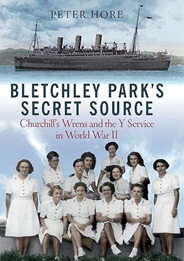
Now everybody's heard of Bletchley Park and the work they did breaking secret codes, but what they don’t tell you was where they got the signals from to decode – and I was in that department. There was a little organisation in the Navy, which was called the Y Service, and we listened in to all the signals that the Germans were making and disposed of them according to what was going to happen. – Hilda Hale
I got the Kindle version of this book having already read Sinclair McKay’s The Secret Listeners, also about the Y Service. The focus here is specifically on the Wrens who made up a large part of Y – McKay’s book also dealt with the male and other non-Wren members of the service.
The primary sources for this, as for The Secret Listeners, include many personal memoirs, which enables individual voices to come through. One characteristic that crops up again and again is wry humour, unsurprisingly a common reaction in the face of tension. Daphne Humphrys, remembering the walk back to her lighthouse station at night: “the eerie, lonely walk along the cliff at dark with ‘your tin hat bumping on your back [which] made you think something frightful was close behind you treading. I’m ashamed to say I was often glad to have the sky lit up by an air-raid.’” Her colleague Vivienne Jabez-Smith, at Ventnor, bemoaned that ‘Two Messerschmitts used to strafe the front every morning, once getting somebody's boyfriend in the shoulder and once, much more serious, shattering the display window of the only decent cake shop”. The unfathomable goings-on of military authority were also a rich source of humour; decades later, Wrens from the South Foreland station were still wondering to what end they had been issued orders, in the event of an invasion, to collect a tin of tuna fish and walk to Bristol.
Most of these girls were very young, often still in their teens. They had been recruited for their linguistic skills, since they would have to listen to and understand German radio messages. Many had spent time at German universities or on exchange programmes with German families. So they tended to be from upper or upper middle-class families. Joy Banham, “eighteen and straight from a country grammar school, with a strict nonconformist background” was at first ill at ease with “such people as Dawn Thompson, who had just come back from studying singing in the conservatory at Lisbon, Ann Turner, who had led a sophisticated life in London, and several others with confident, bossy manners and far more experience of the world than her”. They were, however, of an age to adapt to each other and their new circumstances, which was just as well, for they were often in the front line. Some made the voyage to overseas stations – in another example of official thick-headedness, “despite the tell-tale armfuls of tropical uniform, they were told to say that their destination was Scotland”.
Secrecy, indeed, was paramount, so much so that many Navy personnel had no idea what exactly they were doing; nor did the girls’ own families. When the Aguila was torpedoed, with the loss of 22 Wrens en route for Gibraltar, the news was not publicly reported and individual epitaphs for the girls do not mention it. And the bar on mentioning this work lasted a long time after the war, which may be one reason their considerable contribution to the victory was slow to be acknowledged.
Doubtless a dismissive attitude to women also came into play. “Nancy McKinlay was distressed that, having joined the WRNS in the summer of 1941 from Glasgow University with a degree in French and German and having served at several Y stations and in NID24, she was, after her marriage in 1945, discharged as ‘a married woman of low priority’, terminology which infuriated her for the rest of her life.” And at the Chicksands station in Bedforshire, the needs of the Wrens were clearly not a priority: “when the nearby rest hut, containing an Elsan, a bucket-sized portable toilet, was commandeered by the male chargehand as his workshop and office, the women were obliged to carry the Elsan into the field and use it there”.
Its roots in individual testimony render this a lively and absorbing account. There is inevitably some duplication of events and information from McKay’s earlier book but not so much as to be a problem, for the WRNS focus is enough to individualise it. There’s something about the sheer youth of these girls – joining the Wrens because they fancied the tricorne hat, longing for the visiting admiral to accidentally lean against the recently whitewashed wall – that makes the important work they were doing all the more impressive.
June 16, 2025
Review of Circulation, by Magnus Florin, trs. Harry Watson, pub. Vagabond Voices 2024
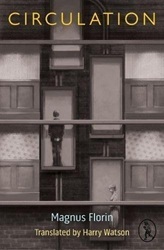
Elin:
“How long have you been here?”
Me:
“Sometimes I think it’s several months. Sometimes only a few days.”
The word “Kafkaesque” is bound to come to mind when discussing a novel about a man working in a huge building (“the bank”) whose business is always a bit of a mystery to him and where life constantly repeats itself. The bank’s crooked managers are periodically found out by the auditors, fired and replaced by equally crooked successors, a staff party is promised but never materialises, bizarre accidents happen for no apparent reason. Meanwhile our unnamed narrator, whose existence at first revolved entirely round “the bank”, gradually begins to make a life outside it, courtesy of Elin, who becomes his wife, and their two children.
There is quite a lot of speculation as to what money actually is and how it works:
“You misunderstand the nature of money. If I steal money from you and buy something from a seller and this seller then buys something from another seller, it does not happen that the law, when it discovers the theft, tries to follow the route of the money and demand it back from the last seller.”
Me:
“But why?”
Him:
“Because it is no longer that money.”
But I think it would be a mistake to assume that money is the crux of the matter. “The bank” could actually be any large business or organisation and anyone who has worked for one, not necessarily a bank, will have many moments of rueful recognition:
“The manager introduced the new standardized paper formats. All the tables, pedestals and cupboards were replaced to suit the new formats.”
Then there is the caretaker asked what his recent promotion entails: “According to the manager, the promotion of a caretaker means the right to be designated as promoted caretaker”.
It seems to me that “the bank” represents the whole world of paid work, that monolith that dominates so many of our lives, and so seldom to our benefit. It begins much like a fairytale: our narrator, effectively orphaned, is expelled from the world of childhood and walks to the big city to seek his fortune, ending up at the bank because he has family connections with it. Indeed it seems most of its employees dropped into the work by chance: “They say that this is not exactly what they once dreamed of”. Our narrator makes periodic noises about leaving and trying something else, but it does not sound as if he ever will.
He does, however, marry and start a family, and judging by the novel’s ending, this is the only truly worthwhile part of his life. Though, as his children Monika and Henrik (his family are the only people in the novel to be named) play in the park, one wonders if they too, eventually expelled from childhood, will end up in “the bank”.
This is such an unorthodox novel that one feels grateful to Harry Watson and Vagabond Voices for getting it translated from Swedish and introduced to a wider audience.
June 1, 2025
Review of Fox Bites, by Lloyd Markham, pub. Parthian 2024
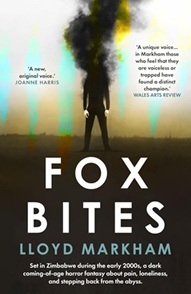
As he gets into the passenger seat, Taban wonders if the story he told Eve is the grimmest she can imagine. Because it isn’t for him. For him the tree’s deformed growth being the result of an unstoppable external force is the happiest plausible explanation. There is another possible version of the tree’s story, which is far more painful to him. In it everything is the same, but there is no lightning to blame. The tree is simply born a twisted mutant.
Well, this is as intense and complex a novel as I’ve read for a while. It has three constantly interwoven strands: first, and most important, what goes on in the life and the head of a boy called Taban, second, politics in Zimbabwe and third, a fantasy strand based loosely on a lot of different mythologies and involving foxes. I‘m not sure quite what it is that attracts poets and novelists to mythical foxes with superpowers; apart from Ted Hughes, there is the Japanese kitsune, which seems to crop up quite often, and Metin Murat’s recent novel The Crescent Moon Fox (Armida, 2022) featured a similar beast.
Markham grew up in Zimbabwe and is thus able to convey a sense of the novel’s place without particularly trying to. There are no passages of conscious topographical description; just the odd mention, in passing, of avenues of jacaranda trees and the need to watch out for crocodiles near the water is enough to remind us where we are.
Taban, small, shy and something of a misfit, sees himself as a victim – he does get bullied, but it is never clear quite how much, because although he is the point-of-view character through whose eyes we see, he is also unreliable. Like most children with a grudge against their world, he fantasises becoming strong enough to take revenge on it and sometimes seems able to do so by sheer force of will. He also has an (adult) alter ego, Solomon Mushonga, from the novel’s “political” strand, who expresses all the latent ruthlessness and potential cruelty of which few would think Taban capable. I may say here that I find this political strand utterly fascinating: there is a scene of an election debate on land reform in a postcolonial situation that is brilliantly done and maintains its audience’s interest in a way you might not think such a fictional scene could do.
Then there is the fantasy strand. I would guess some readers will be leery of this and try to rationalise it. It is certainly possible, for instance, to see the terrible mound of bones Taban and Hilde climb as a reference to political wars:
"The whole top layer of the mound starts sliding. Hilde snatches Taban’s arm to stop him sliding with it. As it peels away, sloughing to the street below, more bones reveal themselves. Hundreds if not thousands. Femurs and clavicles and tibias and sternums and even whole spinal columns. All knotted together like the tails of a rat king. They are different sizes and vary in colour and condition, but they all have one thing in common – they’re from humans."
And the fox-bites which appear only to Taban and his mother are clearly at least in part products of their own minds, the consequence of troubled and guilt-ridden childhoods. Nevertheless, the mythological/fantasy elements can’t be totally reasoned away and must to a degree be accepted. I didn’t have a problem with this, though it wasn’t the element of the novel that most gripped me (and I did feel the magic dagger could maybe have been better seeded; it seems to crop up when there’s suddenly a use for it).
What I found most memorable was Markham’s ability to clinch some concept that matters in a few words. Solomon’s chilling response, when a soldier tells him there is no evidence of a conspiracy: “Lieutenant, I told you to find evidence. Not look for evidence”. And Taban’s moment of self-realisation; “The reason the other students laugh when he gets beaten up is because of what he is. Not what is being done to him.”
Taban’s friend Hilde says at one point, “I’ve always been unhappy – feeling like I was from two places at once”. In some ways this is true of their whole community; born in Zimbabwe, Taban is of European descent and not wholly at home in his birth country, though neither does he identify with the despised “Albions” who used to own it. “Discovering? Really? How can you discover somewhere already home to over a million people? Discovery? Albions have a thousand euphemisms for conquest. Perhaps that is where their language’s nuance lies?”. It is made clear, in fact, that the “Albions” have consistently misunderstood the country from the start; they have made fatally important mistranslations, and Taban’s own name is a mishearing by his parents of the Setswana name “Thabang”. It means “be happy”, ironically enough, since this is something Taban finds elusive. When he is on his way, at the novel’s end, to the UK in a plane, the continuing presence of the fox suggests that you cannot emigrate from what you are.
.



